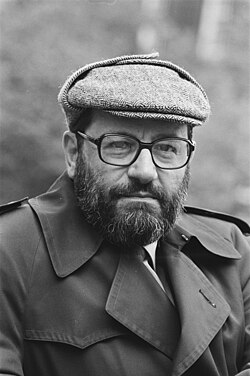Umberto Eco Quote
For centuries, as pope and emperor tore each other apart in their quarrels over power, the excluded went on living on the fringe, like lepers, of whom true lepers are only the illustration ordained by God to make us understand this wondrous parable, so that in saying 'lepers' we would understand 'outcast, poor, simple, excluded, uprooted from the countryside, humiliated in the cities.' But we did not understand; the mystery of leprosy has continued to haunt us because we have not recognized the nature of the sign.
Umberto Eco
For centuries, as pope and emperor tore each other apart in their quarrels over power, the excluded went on living on the fringe, like lepers, of whom true lepers are only the illustration ordained by God to make us understand this wondrous parable, so that in saying 'lepers' we would understand 'outcast, poor, simple, excluded, uprooted from the countryside, humiliated in the cities.' But we did not understand; the mystery of leprosy has continued to haunt us because we have not recognized the nature of the sign.
Related Quotes
Those of us who stand outside the circle of this society's definition of acceptable women; those of us who have been forged in the crucibles of difference - those of us who are poor, who are lesbians,...
Audre Lorde
Tags:
differences, different, exclusion, impoverished, lesbians, outcasts, poor, povetry, race, racism
About Umberto Eco
Umberto Eco (5 January 1932 – 19 February 2016) was an Italian medievalist, philosopher, semiotician, novelist, cultural critic, and political and social commentator. In English, he is best known for his popular 1980 novel The Name of the Rose, a historical mystery combining semiotics in fiction with biblical analysis, medieval studies and literary theory, as well as Foucault's Pendulum, his 1988 novel which touches on similar themes.
Eco wrote prolifically throughout his life, with his output including children's books, translations from French and English, in addition to a twice-monthly newspaper column "La Bustina di Minerva" (Minerva's Matchbook) in the magazine L'Espresso beginning in 1985, with his last column (a critical appraisal of the Romantic paintings of Francesco Hayez) appearing 27 January 2016. At the time of his death, he was an Emeritus professor at the University of Bologna, where he taught for much of his life. In the 21st century, he has continued to gain recognition for his 1995 essay "Ur-Fascism", where Eco lists fourteen general properties he believes comprise fascist ideologies.
Eco wrote prolifically throughout his life, with his output including children's books, translations from French and English, in addition to a twice-monthly newspaper column "La Bustina di Minerva" (Minerva's Matchbook) in the magazine L'Espresso beginning in 1985, with his last column (a critical appraisal of the Romantic paintings of Francesco Hayez) appearing 27 January 2016. At the time of his death, he was an Emeritus professor at the University of Bologna, where he taught for much of his life. In the 21st century, he has continued to gain recognition for his 1995 essay "Ur-Fascism", where Eco lists fourteen general properties he believes comprise fascist ideologies.
